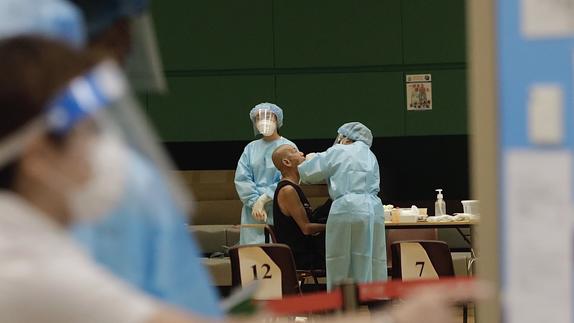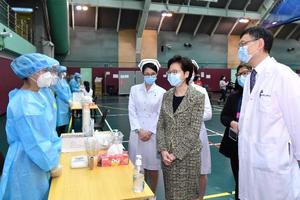 A medical worker wearing protective gear takes a swab sample from a resident at a testing center in Shatin, Hong Kong, Sept 1, 2020. (PHOTO PROVIDED TO CHINA DAILY)
A medical worker wearing protective gear takes a swab sample from a resident at a testing center in Shatin, Hong Kong, Sept 1, 2020. (PHOTO PROVIDED TO CHINA DAILY)
HONG KONG - COVID-19 patients have active and prolonged gut viral infection, even in the absence of gastrointestinal symptoms, scientists in Hong Kong Special Administrative Region showed.
The coronavirus may continue to infect and replicate in the digestive tract after clearing in the airways, researchers at the Chinese University of Hong Kong (CUHK) said
The coronavirus may continue to infect and replicate in the digestive tract after clearing in the airways, researchers at the Chinese University of Hong Kong (CUHK) said in a statement Monday. The findings, published in the medical journal GUT, have implications for identifying and treating cases, they said.
ALSO READ: Southeast Asia detects mutated virus strain sweeping the world
SARS-CoV-2 spreads mainly through respiratory droplets -- spatters of virus-laden discharge from the mouth and nose, according to the World Health Organization. Since the first weeks of the pandemic, however, scientists in the Chinese mainland have said infectious virus in the stool of patients may also play a role in transmission.
A February study of 73 patients hospitalized with the coronavirus in the mainland’s Guangdong province found more than half tested positive for the virus in their stool.
The Hong Kong scientists studied stool samples from 15 patients to better understand the virus’s activity in the gastrointestinal tract. They found active gut infection in seven patients, some of whom had no nausea, diarrhea or other digestive symptoms. Three patients continued to display active viral infection as long as six days after their respiratory samples tested negative for COVID-19.
ALSO READ: WHO chief: There might be no 'silver bullet' for COVID-19
The finding “highlights the importance of long-term coronavirus and health surveillance and the threat of potential fecal-oral viral transmissions,” Siew Chien Ng, associate director of the university’s Centre for Gut Microbiota Research, said in the statement.
Treatments that modulate the composition and functionality of the gut microbiome should be explored, according to Ng. The gut bacteria of patients who were particularly infectious showed a loss of protective microbes and a proliferation of disease-causing ones.
The Chinese University has offered free screening stool tests to travelers arriving at the airport since late March, and identified six infected children among more than 2,000 samples tested. From Monday, up to 2,000 COVID-19 tests will be done daily as part of targeted detection of asymptomatic people.
ALSO READ: The clever game of the coronavirus
More than one patient tested positive even though their respiratory samples were negative, said Francis KL Chan, the university’s dean of medicine and director of the Centre for Gut Microbiota Research.
“Stool test is accurate and safe, making it suitable and more effective for COVID-19 screening for specific groups of people,” Chan said in the statement. Some regulators including the US Food and Drug Administration have reached out about stool tests.
ALSO READ: WHO: Almost a third of COVID-19 samples show mutation
Hong Kong reported 11 new COVID-19 cases on Monday, including five infections detected due to the government’s free Universal Community Testing Programme (UCTP), a health official said.
Four of the five infections were of unknown origin, including that of a pregnant woman who worked for a Chinese medicine clinic, said a Centre for Health Protection (CHP) official.
Out of the 11 new cases, ten were local infections while the remaining one was a domestic worker who arrived from the Philippines. The city’s total number of confirmed cases stood at 4,889, the CHP official added.
As of 8 pm of September 7, a total of about 856,000 specimens collected under the UCTP had been tested. A total of about 1,197,000 persons had registered for testing since the UCTP was launched on September 1.
 Chief Executive Carrie Lam Cheng Yuet-ngor (third right) chats with healthcare workers of the community testing centre at Kowloon City Sports Centre during a visit on Sept 7, 2020. Looking on is St Teresa's Hospital medical superintendent Wong Chi-ming (first right). (PHOTO / HKSAR GOVT)
Chief Executive Carrie Lam Cheng Yuet-ngor (third right) chats with healthcare workers of the community testing centre at Kowloon City Sports Centre during a visit on Sept 7, 2020. Looking on is St Teresa's Hospital medical superintendent Wong Chi-ming (first right). (PHOTO / HKSAR GOVT)
Chief Executive Carrie Lam Cheng Yuet-ngor on Monday visited two community testing centres at the Kowloon City Sports Centre and To Kwa Wan Sports Centre and thanked the healthcare workers and staff members for their dedication and hard work.
The healthcare workers at the two centres come from St Teresa's Hospital and Evangel Hospital.
Lam listened to briefings by staff members and expressed her sincere gratitude to medical superintendent of St Teresa's Hospital Wong Chi-ming and medical superintendent of Evangel Hospital Winnie Ng as well as the healthcare workers and staff members.
READ MORE: Testing digs up 5 infections among HK's 11 new cases
She said that, with their hard work and active participation by members of the public, the UCTP has been running smoothly with a number of asymptomatic patients identified. Lam also chatted with members of the public who took the tests and said she was pleased to note that they were satisfied with the program.
Lam appealed to other members of the public to avail of the free tests and help government identify asymptomatic patients in the community.
With inputs from Bloomberg


